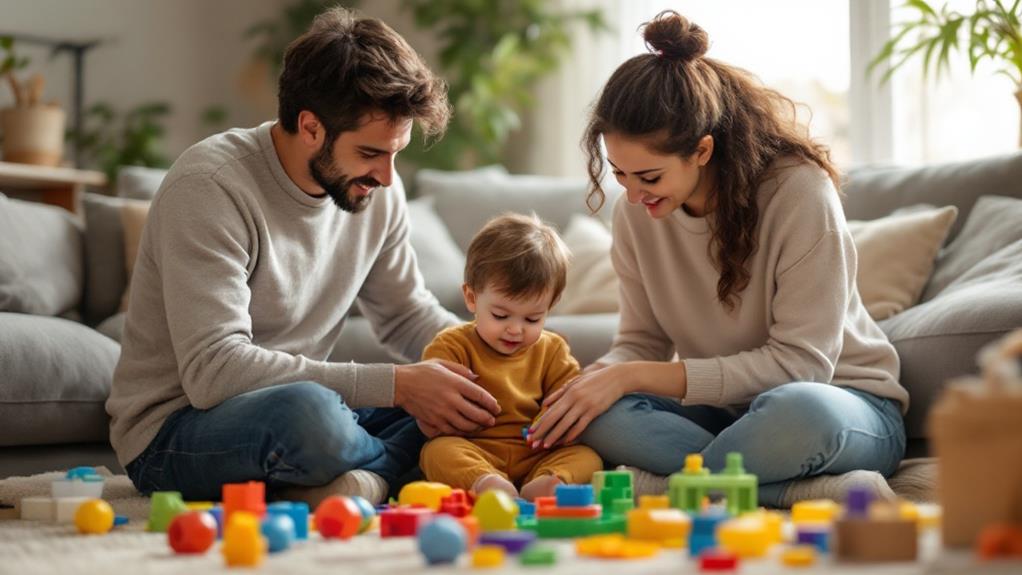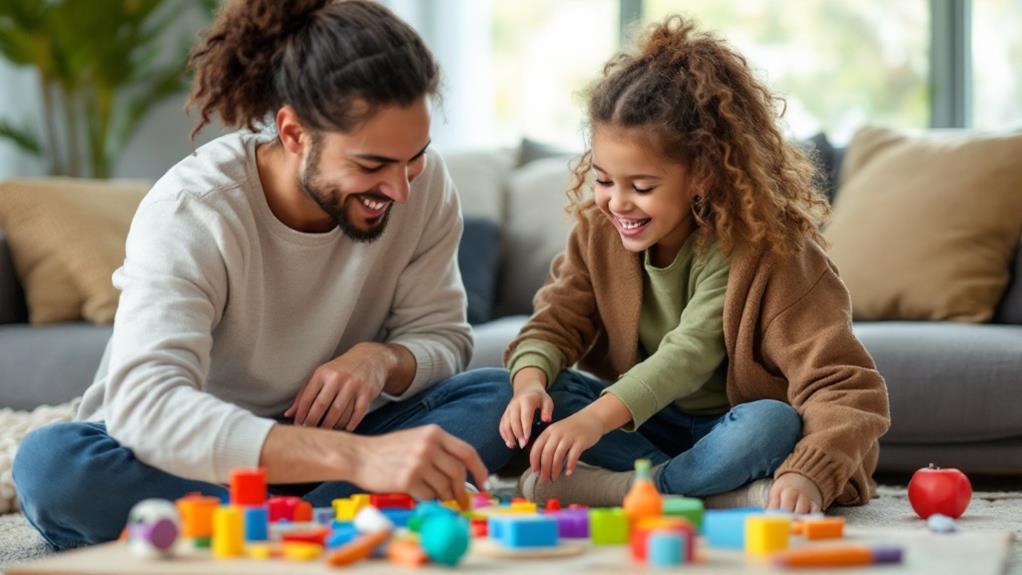You're essential to your child's therapy journey, and your involvement can make a real difference in their progress. Start by understanding their unique needs and feelings, and maintain open communication with their therapist. Set achievable goals together to empower your child, and create a supportive environment at home that encourages expression. Reinforce the skills learned in therapy through everyday activities, and actively participate in sessions to show your child you care. Celebrate small victories along the way, too. There are even more ways to support your child's growth, so let's explore those together.
Key Takeaways
- Maintain open communication with your child and therapist to ensure a collaborative approach to therapy and share insights about your child's progress.
- Attend therapy sessions actively, engaging in activities and observing techniques to support your child's development at home.
- Set realistic, achievable goals with your child to foster a sense of ownership and boost their motivation throughout the therapeutic process.
- Create a supportive home environment by establishing routines and incorporating relaxation activities that help reduce anxiety and promote emotional well-being.
- Reinforce skills learned in therapy by integrating them into daily life and celebrating small victories to build your child's confidence and motivation.
Understand Your Child's Needs

Understanding your child's needs is essential for fostering their emotional and psychological well-being. When you take the time to truly understand what your child is experiencing, you create a strong foundation for their growth. Pay attention to their behaviors, feelings, and reactions. Each child expresses their needs differently, so observing closely can reveal patterns that you might otherwise overlook.
Ask open-ended questions that encourage them to share their thoughts and feelings. This not only helps you gain insight but also shows your child that their feelings are valid and important. Remember, it's okay to admit when you don't have all the answers. Being honest about your own feelings can strengthen your relationship and build trust.
Additionally, keep in close contact with your child's therapist. They can offer valuable insights into your child's needs and progress. Don't hesitate to seek advice on how to support your child effectively at home.
Engaging with your child in a supportive, empathetic manner empowers them to express themselves and feel safe. Your involvement is vital; together, you can navigate this journey toward healing and growth.
Communicate With the Therapist
Maintaining open lines of communication with your child's therapist is essential for supporting their therapeutic journey. This collaboration allows you to share insights about your child's behaviors, emotions, and progress.
Start by scheduling regular check-ins with the therapist to discuss any concerns or observations you might have. This not only helps you stay informed but also demonstrates your commitment to your child's growth.
Be honest and transparent about your child's experiences at home. If you notice changes in their mood or behavior, let the therapist know; this information can be invaluable in tailoring their treatment.
Don't hesitate to ask questions—whether it's about techniques being used in sessions or ways you can reinforce therapy at home.
Your therapist is a partner in this journey, and your input can enhance the effectiveness of the therapy. Remember, you're an advocate for your child's needs, and your engagement can make a significant difference.
Celebrate the small victories together and express gratitude for the support your child is receiving. This positive relationship can empower your child to thrive and reach their fullest potential.
Set Realistic Goals

After establishing a solid line of communication with your child's therapist, it's important to focus on setting realistic goals for their therapy. Start by discussing your child's strengths and challenges with the therapist. This understanding will guide you in creating achievable objectives that promote growth without overwhelming them.
Break down larger goals into smaller, manageable steps. For instance, if social skills are a focus area, aim for specific milestones, like initiating a conversation or taking turns during play. Celebrate these small victories along the way! This not only boosts your child's confidence but also reinforces their motivation to continue progressing.
Make sure to involve your child in the goal-setting process, too. Ask them how they feel about the goals and what they'd like to work on. This empowers them and fosters a sense of ownership over their therapy journey.
Create a Supportive Home Environment
Creating a supportive home environment plays an essential role in your child's therapy journey. You can make your home a safe space where your child feels understood and valued.
Start by fostering open communication; encourage your child to express their feelings and thoughts without fear of judgment. This openness helps build trust, making it easier for them to engage in therapy.
Establishing routines can also provide stability. Consistent daily schedules help your child know what to expect and reduce anxiety. Incorporate time for relaxation and fun activities, allowing your child to unwind and enjoy their interests.
Furthermore, create a distraction-free area for your child to work on skills or homework related to therapy. This space should feel inviting and supportive, filled with their favorite things to help them feel comfortable.
Lastly, show your enthusiasm for their progress, no matter how small. Celebrate achievements together, reinforcing their belief in their abilities. Your encouragement can be a powerful motivator, helping your child navigate their therapy with confidence.
Reinforce Skills Practiced in Therapy

Continuing to support your child's therapy journey means reinforcing the skills they practice in sessions. It's important to integrate these skills into everyday life. One effective way to do this is by creating opportunities for your child to use what they've learned. For instance, if they've been working on communication skills, engage them in conversations about their day or their interests. Encourage them to express their feelings and thoughts openly.
Another great strategy is to celebrate small victories. When your child successfully uses a skill at home, acknowledge it! This positive reinforcement boosts their confidence and motivates them to keep trying. You might say, "I noticed how well you shared your toys today—great job!"
Incorporate games or activities that align with their therapy goals. Whether it's role-playing scenarios or practicing new skills during family outings, these moments can make learning fun and engaging.
Be Involved in Sessions
Many parents find that being involved in their child's therapy sessions can make a significant difference in their overall progress. When you attend these sessions, you create a supportive environment that fosters open communication. You can ask questions and clarify strategies that the therapist is using, which helps you understand how to reinforce those methods at home.
It's essential to participate actively—engage in the activities and show your enthusiasm. Your presence can motivate your child and demonstrate that you value their efforts. You can also observe how the therapist interacts with your child, picking up on techniques you can use during your daily routines.
Don't hesitate to share your insights about your child's behavior and progress; your perspective is invaluable. By collaborating with the therapist, you form a united front, ensuring your child feels supported both in and out of therapy.
Lastly, remember to be patient. Some sessions may be challenging, but your involvement shows your child that they're not alone in this journey. Together, you can navigate the ups and downs, leading to meaningful progress and growth. Your encouragement can make all the difference!
Monitor Progress and Adjust Strategies

Monitoring your child's progress in therapy is essential for ensuring that the strategies being used are effective and aligned with their needs. Regularly check in with your child about how they feel during and after sessions. Their insights can provide valuable feedback on what's working and what might need adjusting.
It's also a good idea to communicate openly with your child's therapist. Share your observations and ask for updates on your child's progress. This partnership can help identify areas of strength and those that may require different approaches.
Consider keeping a journal to track milestones, challenges, and any changes in behavior or emotions. This not only helps you stay informed but also allows you to celebrate small victories along the way.
If you notice that certain strategies aren't yielding the desired results, don't hesitate to discuss alternatives with the therapist. Flexibility is key; adapting to your child's evolving needs can make all the difference.
Foster Emotional Connection and Trust
As you monitor your child's progress and adjust strategies, it's equally important to focus on fostering an emotional connection and trust between you, your child, and their therapist.
Building this foundation creates a safe space where your child feels heard and understood. Start by encouraging open conversations about their feelings and experiences in therapy. Ask them what they enjoyed, what was challenging, and how they felt afterward.
Show your child that you're actively engaged by attending therapy sessions when appropriate. Your presence can provide reassurance and demonstrate to your child that you're a team.
Be supportive and patient; healing takes time, and your child needs to know they can rely on you.
Trust also involves respecting the therapist's role. Encourage your child to speak openly with their therapist, reinforcing that it's okay to share their thoughts and concerns.
Conclusion
By actively participating in your child's therapy journey, you're not just standing on the sidelines; you're in the game, helping them thrive. Remember, it takes a village, and your involvement can make all the difference. Keep the lines of communication open with the therapist, set achievable goals, and create a nurturing environment at home. With your support, your child can spread their wings and soar towards success, turning challenges into stepping stones for growth.
